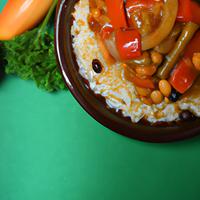
1 serving (250 grams) contains 200 calories, 6.0 grams of protein, 5.0 grams of fat, and 35.0 grams of carbohydrates.

Log this food in SnapCalorie

Nutrition Information
Calories |
188.7 | ||
|---|---|---|---|
% Daily Value* |
|||
| Total Fat | 4.7 g | 6% | |
| Saturated Fat | 0.9 g | 4% | |
| Polyunsaturated Fat | 0 g | ||
| Cholesterol | 0 mg | 0% | |
| Sodium | 566.0 mg | 24% | |
| Total Carbohydrates | 33.0 g | 12% | |
| Dietary Fiber | 6.6 g | 23% | |
| Sugars | 7.5 g | ||
| protein | 5.7 g | 11% | |
| Vitamin D | 0 mcg | 0% | |
| Calcium | 75.5 mg | 5% | |
| Iron | 2.4 mg | 13% | |
| Potassium | 471.7 mg | 10% | |
* Percent Daily Values are based on a 2,000 calorie diet. Your daily values may be higher or lower depending on your calorie needs.
Food Attributes
Source of Calories
About Vegetarian creole
Vegetarian Creole is a vibrant, plant-based dish inspired by the bold flavors of Creole cuisine, which originates from Louisiana's rich cultural fusion of French, Spanish, African, and Caribbean influences. This hearty, savory meal typically features a base of tomatoes paired with aromatic vegetables such as bell peppers, celery, and onions — known as the "Holy Trinity" of Creole cooking. Common additions include garlic, okra, beans, and spices like cayenne, paprika, and thyme, delivering a naturally flavorful experience without relying on meat. Packed with fiber, vitamins A, C, and K, and antioxidants, Vegetarian Creole is a nutrient-dense choice that supports heart health, digestion, and immune function. With minimal saturated fat and cholesterol, it's a lighter alternative to traditional Creole dishes. However, sodium content can be high if canned ingredients or seasoning blends are used, so opting for fresh ingredients and low-sodium options ensures a healthier preparation.



